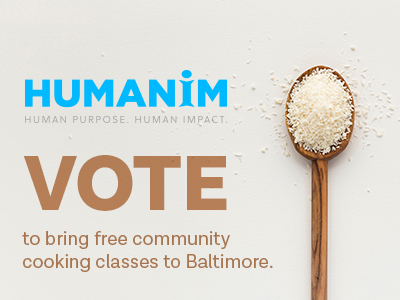
We need your votes to bring free cooking classes to community members through our social enterprise School of Food’s Community Kitchen!
As many of you know we are working tirelessly creating jobs in Baltimore through our social enterprise division. We need your support in bringing vital community cooking resources to our East Baltimore neighborhood. Humanim social enterprise School of Food has been selected as a State Farm Neighborhood Assist® Top 200 Finalist. State Farm’s Neighborhood Assist program will award a $25,000 grant to the top 40 vote-receiving causes – and you can help by casting your vote for School of Food!
This grant award will allow School of Food to provide basic cooking classes to 300 community members who lack access to healthy food and educational resources. Community residents will learn basic to intermediate cooking techniques, and while doing so, cook healthy food in class, eat a family style meal together and take leftovers home. Most importantly the participants will have the knowledge to be able to replicate these essential cooking skills in their home, and provide healthy, nourishing meals for their families.
How to Vote:
To vote: Starting Wed., Aug. 15th – go to https://www.neighborhoodassist.com/entry/2011128 to register, and vote for School of Food. Voting participants can *each* day during the voting period from Aug. 15th to Aug. 24th. Every vote (and day) counts1 We are extremely grateful for your time and support.
More about School of Food’s Community Kitchen:
Located in the heart of East Baltimore, a food desert where residents lack access to healthy food and the median household income is $29,829 – School of Food’s Community Kitchen is building a community that can support a robust food economy, and where residents can provide healthy, nourishing food for their families while understanding the impact of food within their own neighborhoods. School of Food’s Community Kitchen aims to promote cooking behaviors (confidence related to cooking skills, perceived barriers related to cooking at home), food resource management (ability to purchase food on a budget and still make healthy food purchases), change in dietary choices and consumption patterns.